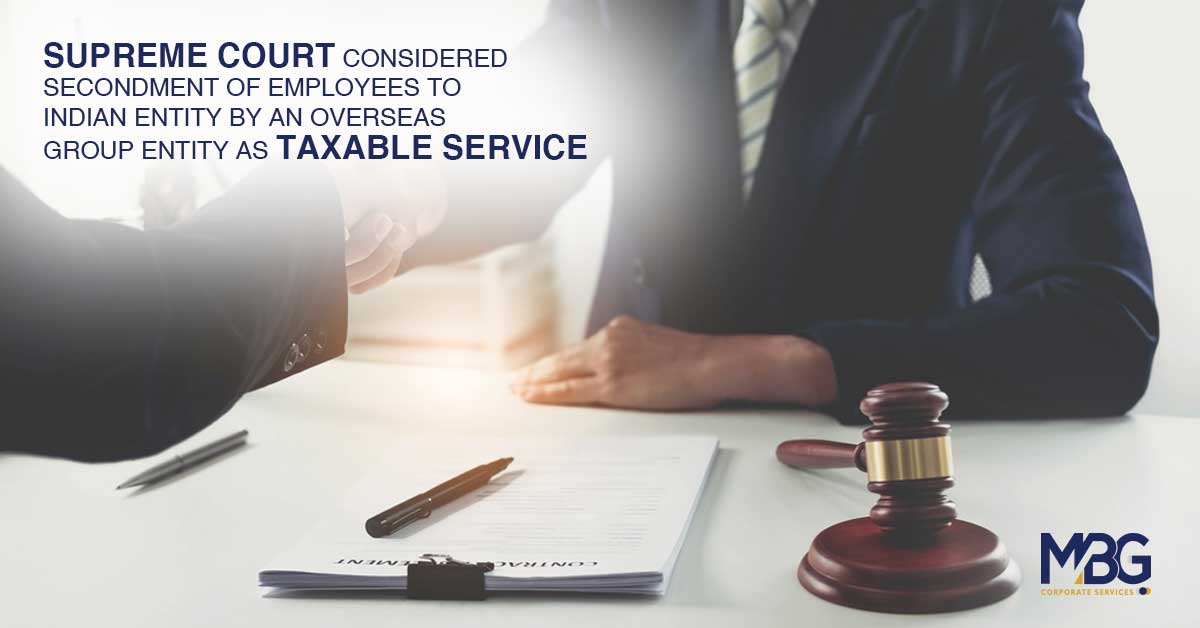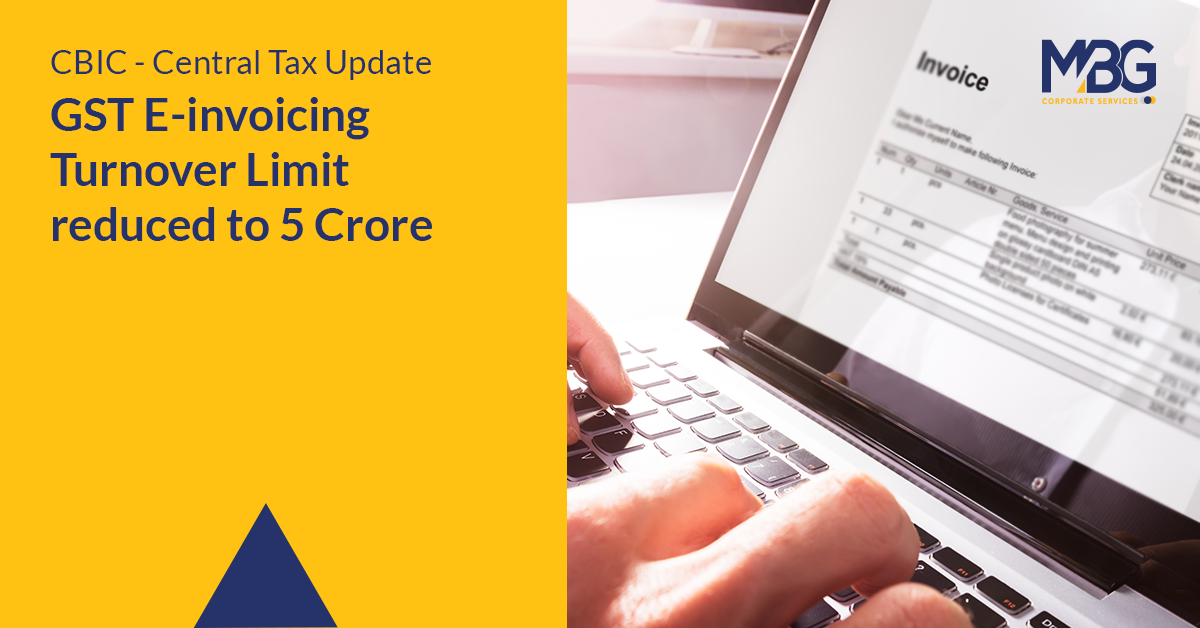Supreme Court considered secondment of employees to Indian Entity by an Overseas Group Entity as taxable service
July 04, 2022

This document intends to place tax insights on the landmark judgment by the Hon’ble Supreme Court (SC) in the matter of CE&ST vs. Northern Operating Systems Private Limited. The issue pertains to the applicability of service tax on reimbursement of salary cost of seconded employees to the overseas entity. It was held that the Indian Entity / Assessee was the service recipient for the service (of manpower recruitment and supply services) from the overseas entity with respect to the employees, it seconded to the assessee for the duration of their deputation or secondment. The SC observed that the overseas group entity has a pool of skilled employees who are entitled to a fixed salary structure and return back to such group entity after cessation of secondment with the Indian entity. The SC noted that seconded employees remained on the payroll of the overseas entity itself. The SC applied the principle of “substance over form” after observing the fact that no singular determinative test, could be laid down to conclude the employer-employee relationship and termed this arrangement to be a “quid pro quo” for the secondment agreement, where the Indian entity derived economic benefit from the overseas company.
Facts of the case
The Respondent, Northern Operating Systems Pvt. Ltd. / Assessee / Indian Entity had entered into an agreement with overseas group company to provide general back-office operation support services. The overseas Group Company selects and transfers managerial & technical personnel to facilitate business activities of the Indian entity;
Based on the arrangement between Indian and overseas group entity, seconded employees have to act in accordance with the instructions and directions of the Indian entity. Secondment was for a limited duration and seconded employees shall continue to be on the payroll of the overseas group entity for salary, bonus, social benefits, retirement benefits, but for all other practical purposes the assessee will be the employer.
The overseas entity shall raise debit note on the Indian entity to recover the expenses of salary, bonus etc. Further, compliances under Income Tax and PF laws were also undertaken by the Indian entity. On the cessation of secondment the seconded employees shall be repatriated back to the overseas entity as per the global repatriation policy;
Proceedings were initiated by the service tax Department. on the pretext that the secondment would tantamount to import of service under “Manpower Recruitment Supply Agency” for the period October 2006 to September 2014.
The Assessee submitted that the services provided by the overseas company does not fall under manpower recruitment or supply agency services for the period prior to negative list. Further, for the period after introduction of negative list, the definition of the term ‘service’ under the Finance Act, specifically excluded service provided by the employee to the employer. Thus, the amount paid to the overseas foreign entity as reimbursement of salary cannot be construed as a consideration for the supply of manpower services.
The Appellate Authorities dropped the proposals in the SCN issued by the adjudicating authorities. However aggrieved by the orders in favour of Assessee, the revenue finally moved before Hon’ble Supreme Court.
The Contentions of the Assessee
Prior to July 2012 “Manpower Recruitment or Supply Agency” under section 65(68) of Finance Act, 1994, means any person engaged in providing service, directly or indirectly, in any manner for recruitment or supply of Manpower, temporary or otherwise to any other person.
Conjoint reading of Circular F.No. B1/6/2005-TRU dated 27.07.2005 with the Master Circular No. 96 / 7 /2007-ST dated 23.08.2007– clarified the scope of ‘Manpower Recruitment or Supply Agency’ service to include staff who are not contractually employed by the recipient but come under his direction. Further post July 2012 under exclusions of Section 64(44) i.e. under negative list regime, the service provided by an employee to the employer in the course of employment was kept outside the definition of ‘service’.
In light of the above, scope of the term Manpower Recruitment of Supply Agency is not applicable in the present case as the definition of service specifically excluded such transaction, where the employer- employee relationship exists.
Also, the Assessee was undertaking compliances of the Seconded employees under Income Tax Act, 1961 & PF Laws under employer – employee relationship.
In the present case, as per the master service agreement the Indian entity was required to support overseas entity for back office operations on cost plus mark-up basis. The overseas entity was requested to second technical personnel to Indian entity, putting all their time and efforts under the direction of the Indian entity. Solely for the sake of convenience, the salary was disbursed by the overseas entity for continuity of social security benefits of employees in their home country, the salary & other allowances paid by the overseas entity was recovered from Indian entity via debit note. Consequently, an employer-employee relationship existed between the Indian entity and the personnel deputed in India.
Observation(s) & Ruling by Hon’ble Supreme Court
The Hon’ble SC while observing that no isolated determinative test, could be laid down to conclude employer-employee relationship, states that such examination must be based on a multitude of factors. Thus, by the virtue of “substance over form” approach to identify the “real” employer, the SC undertook a detailed review of – (1) master services agreements between the Assessee and the overseas entity; (2) secondment agreements; and (3) letters of understanding issued to the Seconded Employees by the Assessee.
The SC based on the above analysis concluded that a real employer employee relationship exists between the seconded employees and the overseas group entity instead of Indian entity on the following factors:
- Lien on employment of Seconded Employees vested with the overseas entity – Since the Seconded Employees continued to be on the overseas entity’s payroll while the operational and functional control was exercised by the Assessee over the seconded employees only for the secondment period, such control was necessary to ensure performance of the duties entrusted to them. However, it was merely facial. Thus, the arrangement was a “contract for service” and not a “contract of service”.
- Specialised nature of services – The SC observed a ‘Vital Fact’ to be considered is that the nature of business of the overseas group entities was to secure contracts which required highly trained and skilled personnel. The role of the Assessee was to optimize the economic edge for which the employees of overseas entity are deployed for the duration of task required to be completed.
- Salary/allowances in foreign currency - The fact that salary package, allowances, etc., were all expressed in foreign currency and separate allowances like hardship allowance of 20% basic salary were granted for working in India.
- Repatriation back to overseas entity - The Assessee had no right to terminate seconded employees and it could only ask for their replacement if their performance wasn’t satisfactory. Further, the Seconded Employees had to be repatriated to their overseas employer as per Global Repatriation Policy (of overseas entity).
- Element of provision of service – the overseas company in relation to its business, deployed its employees to the Assessee on secondment. Further, overseas company was charging 1% of actual cost incurred as the administrative charges.
- Economic Benefit derived by the Assessee – Payments in the form of remittances or amounts, by whatever manner during secondment may reckon as one method of discharging consideration against manpower supply on the fact that the Assessee has derived economic benefit by securing specific jobs or assignments from Overseas group entity (based on the principle of quid pro quo).
In light of the above, it was held by the Hon’ble Supreme Court that the Assessee was the service recipient of manpower recruitment and supply services provided by the overseas entity, vis a vis the employees it seconded to the Assessee, for the duration of their deputation or secondment over an assignment to India.
Further, the earlier orders by the Courts relied upon in the context of secondment of employees by overseas entity and revenue neutrality in favour of Assessee(s) are held as having limited or no precedential value in current matter since they were without any independent reasoning.
The only relief provided by the SC to the Assessee was that the extended period of limitation under service tax would not apply in such case.
Our Comments
- This is a landmark and crucial decision wherein employee secondments by overseas group entities are held to be manpower supply service as documents proved that overseas company continued to remain economic and legal employer of the seconded employees.
- This decision would have far-reaching implications. The companies having similar arrangements with overseas group entities may need to analyse the impact of the ruling in line with the Contract clauses of the agreements entered between the group companies and the employee not only from the standpoint of service tax regime but also under the GST regime.
- This ruling may also impact the position taken by the taxpayers where no payment / reimbursement of salary & other allowances of seconded employees are being remitted to overseas entity and effectively the overseas entity only bears the cost directly and makes salary payments to the seconded employees in the home country, which may held to fall under tax net by virtue of Schedule-1 of CGST Act, 2017 “Activities to be treated as supply even if made without consideration” between related persons.
Last updated: 04/07/2022
Article contributed by:
Partner- Taxation Advisory & Compliance Services








